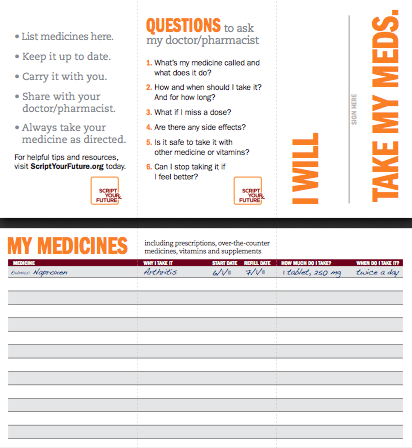A key component of illness management is the use of prescribed medications. For those who have several chronic conditions, there are usually numerous prescribed medications to keep track of and their effectiveness and benefits depend on the patient’s adherence. Non-adherence (failure or delay in refilling prescriptions, cutting dosages, reducing frequency of administration) can lead to significant consequences.
A key component of illness management is the use of prescribed medications. For those who have several chronic conditions, there are usually numerous prescribed medications to keep track of and their effectiveness and benefits depend on the patient’s adherence. Non-adherence (failure or delay in refilling prescriptions, cutting dosages, reducing frequency of administration) can lead to significant consequences.
Non-adherence is common and is an enormous burden to the healthcare system. Adherence may seem like a straightforward behavior – but it is complex. The patient must make an appointment with a physician, get prescribed medication, take the prescription to be filled, remember to administer the medication at the appropriate time and in the appropriate dosage, refill the prescription and return to the provider for on-going monitoring. A paper put out by Duke University states that half of the 3.2 billion annual prescriptions dispensed in the US are not taken as prescribed and that patients with chronic conditions adhere only to 50-60 percent of medications as prescribed. They go on to say that medication non-adherence leads to approximately 125,000 deaths per year in the US.
Because non-adherence is a complex issue, the solution is multi-faceted. The patient and the medical team must work together to make sure the patient understands the importance of following the medication regimen. The patient’s family plays a crucial role here as they can work directly with the patient. The provider needs to follow established guidelines and provide resources for patients and their families about medications and how to prevent non-adherence.
There have been several campaigns for medication adherence over the years. Recently, the National Consumers League and its partners have developed a Script Your Future campaign which is a multi-year public education effort focused mainly on patients with 3 chronic conditions: diabetes, respiratory disease and cardiovascular disease. The ScriptYourFuture website contains tools for providers and patients such as a Script Your Future wallet card (see image at left) that helps keep track of medications and dosages. This card is available in Chinese, Spanish and Vietnamese. There is an Adherence Estimator which is a questionnaire that helps patients and caregivers have a conversation about medication adherence. There is a even a Medicine Reminder that patients can sign up for by giving their phone number and a Pledge that patients can create for themselves or their loved one.
The website also has helpful information on the 3 key chronic conditions and why medication adherence is so important for these diseases.
Another good site that talks about the importance of medication adherence is MerckEngage. MerckEngage also has an adherence estimator questionnaire and provides the download of a wallet card for listing medications. They have information on various diseases and the medications that treat them. And they have Condition Tracking Tools for asthma, blood pressure, blood sugar, cholesterol, migraine and weight/BMI
There are numerous other medication adherence aids from various companies that I found during a web search. Vitality makes GlowCaps, a chip in the cap of a pill bottle that monitors when it is opened and tracks for medication adherence that way.
Patient Reminders (in the UK) offers patients the opportunity to sign up for SMS messaging to improve adherence. E-Pill offers several compliance aids, including a vibrating wristwatch, pill box and automatic pill dispenser.
Poor medication adherence leads to considerable morbidity, mortality, and avoidable health care costs. The patient, the patient’s immediate family, caregivers, professional medical team and provider network need to work together to ensure that everyone is well aware of the issues.
Take the Pledge; Take Your Meds!
Sources:
MerckEngage: Make the Most of Your Medicine
Script Your Future: Tools
Duke University Med Ctr: Medication Adherence-Making the Case for Increased Awareness
If you like this post, please read other posts in the series on the Person-Centered HealthCare main page. And if you have a story to tell that may be a fit with our series, please comment below or email me at joan@socialmediatoday.com